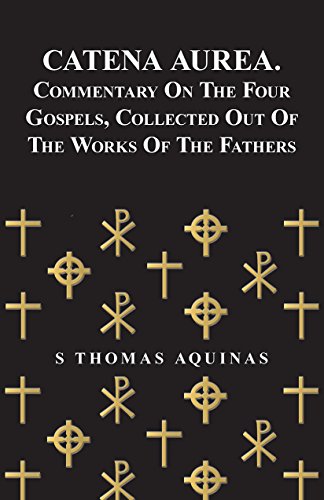صدر حديثًا
هذا الكتاب جديد وسيتم رفعه فور توفره لدينا وبعد الحصول على حقوق النشر اللازمة.

كتاب Catena aurea PDF
(0)
المؤلف:
توما الأكوينيعدد القراءات:
191
اللغة:
الإنجليزية
الفئة:
الأديانالقسم:
الصفحات:
229
الجودة:
جيد
المشاهدات:
1148
اقتباس
مراجعة
حفظ
مشاركة
وصف الكتاب
Catena aurea : commentary on the four Gospels collected out of the works of the Fathers
St. Thomas’ commentary on the Gospel of St. John is unique among his many writings on Sacred Scripture. It is the work of a master theologian, delivered at the University of Paris, then the intellectual center in Christendom, when Thomas was at the height of his fame and apostolic zeal for souls. A fourteenth-century list of Thomas’ writings notes that this commentary is a reportatio by Reginald of Piperno and adds “better than which none can be found.” Areportatio is a verbal report of an actual lecture taken down by a scribe or student in the course of actual delivery. In this case the scribe was the faithful Friar Reginald of Piperno, who had been the “constant companion,” or socius, for the last fifteen years of Thomas’ short but busy life. The Italian Province of Dominicans wisely provided Thomas with this kind of personal secretary and general factotum after he returned from Paris as a Master in Sacred Theology in 1260.
A reportatio is not exactly a dictation in our sense of the term; it is more like a student’s notebook in shorthand containing basically the gist of what is being said, but usually with varying numbers of verbal omissions and inaccuracies. But this commentary is more than a mere scribal report. It was in fact “corrected” by Thomas himself—if we are to believe Tolomeo of Lucca, one of Thomas’ early biographers and confreres—before the commentary went into circulation through copies made by hand, the customary mode of publication before the era of the printing press. More than that: according to Bernard Gui, another confrere and early biographer, Thomas himself wrote out in full the commentary on the first five chapters of John (and hence this section ought to be considered an authentic expositio, or authoritative version), while the rest of it survived in the hand of Reginald, corrected by Thomas.
This commentary was very popular in the Middle Ages, and it ranks among the best of Thomas’ work as a master theologian and saintly man of faith. It was read not only by theologians searching for the truth, but also by preachers and pious men and women desiring solid food for meditation and fervent prayer. Scattered throughout the world there still exist thirty-three complete and thirteen incomplete manuscript copies of this work, attesting to its considerable popularity before the age of printing. Innumerable copies of this work have no doubt been lost or destroyed in the tumult of centuries following the Middle Ages.
This detailed commentary is St. Thomas’ personal response to the Word of God Incarnate as described in the sublime words of John “the Divine.” For St. Thomas, the God of Abraham, Isaac, and Jacob spoke to his chosen people through the mouth of prophets in the long course of salvation history, “But when the appointed time came, God sent his Son, born of a woman, born a subject of the Law, to redeem the subjects of the Law and to enable us to be adopted as sons” (Gal 4:4-5). This Incarnate Son, Jesus Christ, is the total manifestation of the Father, the Eternal Word made flesh. There is nothing left unsaid in the Word; the Father’s love is complete in the love the Son bears for the Father and for us. Christ’s whole life, his passion, death, and resurrection, are the praise and glory of the Father “through the working of the Holy Spirit.” “You must believe me when I say that I am in the Father and the Father is in me” (Jn 14:11). “Whatever you ask for in my name I will do, so that the Father may be glorified in the Son” (Jn 14:13). Christ’s “food” was to do the will of his Father in all things, thus glorifying the Father in Jesus.
توما الأكويني
توما الأكويني (راهب دومينيكاني) (1225 - 1274) قسيس وقديس كاثوليكي إيطالي من الرهبانية الدومينيكانية، وفيلسوف ولاهوتي مؤثر ضمن تقليد الفلسفة المدرسية. أحد معلمي الكنيسة الثلاثة والثلاثين، ويعرف بالعالم الملائكي (Doctor Angelicus) والعالم المحيط (Doctor Universalis). عادة ما يُشار إليه باسم توما، والأكويني نسبته إلى محل إقامته في أكوين. كان أحد الشخصيات المؤثرة في مذهب اللاهوت الطبيعي، وهو أبو المدرسة التوماوية في الفلسفة واللاهوت. تأثيره واسع على الفلسفة الغربية، وكثيرٌ من أفكار الفلسفة الغربية الحديثة إما ثورة ضد أفكاره أو اتفاقٌ معها، خصوصاً في مسائل الأخلاق والقانون الطبيعي ونظرية السياسة. يعتبر الأكويني المدرس المثالي لمن يدرسون ليكونوا قسساً في الكنيسة الكاثوليكية. ويُعرف بعمليه خلاصة اللاهوت والخلق والخالق. يعتبره العديد من المسيحيين فيلسوف الكنيسة الأعظم لذلك تُسمى باسمه العديد من المؤسسات التعليمية.
الكتاب غير متاح حاليًا
هذا الكتاب غير متاح حاليًا للنشر. لقد حصلنا عليه من بموجب ترخيص المشاع الإبداعي، ولكن المؤلف أو دار النشر لم يمنحا الإذن بنشره.
قيم الآن
5 نجوم
4 نجوم
3 نجوم
2 نجوم
1 نجوم
اقتباسات Catena aurea
الأعلى تقييماً
الأحدث
اقتباس
كن أول من يترك اقتباسًا واكسب 10 نقاط
بدلاً من 3
التعليقات
كن أول من يترك تعليقًا واكسب 5 نقاط
بدلاً من 3